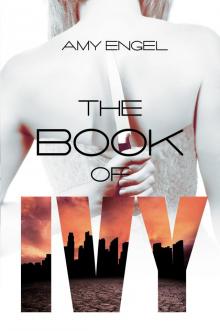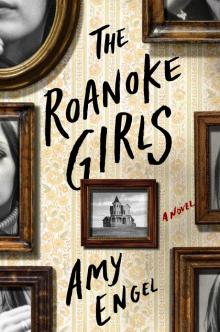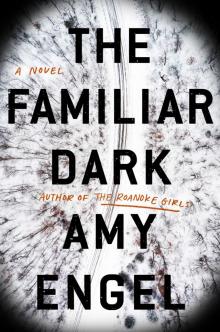The Book of Ivy Read online
Page 5
“It wasn’t like that,” I say, my own voice rising. “I mean, maybe he’s acting. But it seems like he just wants to get to know me.”
“Of course he’s acting,” Callie says, like I’m the dumbest person alive. “All he cares about is keeping his dad in power and you giving him a bunch of sons to continue the line. He’s not interested in you.”
I shift away from her, fix my gaze on the far side of the pond. I know what she’s saying is true, but it doesn’t exactly feel true, at least not completely, not when I remember the way Bishop asked me about myself, like he really cared about the answers.
“Remember what we talked about? How they’ll try to muddle your thinking? Turn black to white and up to down? Try to make you believe he cares more about you than we do?”
I nod. I know she’s right. I know what the truth is; I know my family wouldn’t lead me astray and everything they ask me to do is for the good of us all. I have to be strong enough to remember their lessons. More than anything, I want to make them proud.
“Don’t let him fool you,” Callie says, and her voice is gentler now. “Don’t forget what they’re capable of.” She pauses. “Remember what they did to Mom?”
I close my eyes. “Yes,” I say, the familiar anger flowing through my veins. I have no memory of my mother, only a few stories passed down from Callie—how she sang us to sleep at night, how her hair always smelled like lavender. Stories I’ve relived so often in my mind that now they are worn and threadbare. But for everything I don’t know about my mother, the one thing I’m sure of is that my life would have been different if she’d lived. My father quicker with a smile, less instructor and more parent. Callie less bitter and more joyful. All of us whole, instead of forever missing a vital piece. When President Lattimer killed my mother he did more than take her life. He took the lives we should have had as well.
“Keep your eyes on the goal, Ivy,” Callie says. “Don’t let your temper or your mouth get the best of you. You need to manipulate, not confront. That’s how you’ll get to him.” She scoots closer to me, rests her hand on my back.
“Remember the dog?” she asks. I don’t bother nodding because I know she’s going to tell me the story anyway. “We’d walk to the market past that stupid, mangy dog Mrs. Paulson always had tied to her fence. And every day it would lunge at us and bark and go crazy. I told you a hundred times to ignore it, keep walking. I told you I’d figure out a way to handle that dog. But it made you so mad, that we had to be scared whenever we walked down the street.” Callie removes her hand from my back and lays it on my arm. “Then one day you’d had enough, and you marched over there and swung your bag at it.” Her voice sounds amused, but her eyes are serious. “And this is what you got in return.” She rolls my forearm to the side, revealing the shiny, almost silvery scar tissue, traces her finger over the bite marks, the ripped and remade flesh. “All because you couldn’t bide your time.” She lets go of my arm. “Who won that day, Ivy? You or the dog?”
I glare at her, hating her just a little bit. “The dog,” I finally say.
“But who won in the end?” she asks. The look in her eyes, a kind of wicked triumph, sends a sliver of unease down my spine.
“You did,” I whisper, remembering the morning, not long after I was bitten, when we walked to the market and the dog lay dead, his chain wrapped around his neck, his tongue black where it lolled out of his half-open mouth.
“Don’t bait him, Ivy,” she says, standing up. “Don’t ruin everything just to make a point.” She brushes off the seat of her shorts with both hands. “We’re not in this to win a few battles. We’re in it to win the war.”
B
ishop returns home at five, exactly as he said he would. I didn’t bother making dinner because I wasn’t sure he’d be true to his word. He finds me lounging on one of the wicker couches on the screened porch, my bare legs hanging over the arm, feet dangling.
“Hi,” he says. “How was your day?” He’s got a small sack of groceries in one arm. There is a container of strawberries resting at the top.
“Boring,” I tell him. There’s a pause that goes on too long. “How was yours?”
He shrugs, turns to set the bag down on the kitchen table behind him before joining me on the porch. “Fine. Uneventful.” He takes a seat on the sofa opposite me. “You’re too smart to sit around here all day staring at the walls,” he says.
“How do you know I’m smart?”
He just stares at me. In moments like this, it’s easy to see how he was born to be a leader. His is the kind of face that intimidates simply by existing, so handsome it’s almost scary. He has a strong jaw, with just the barest hint of his father’s cleft chin, high cheekbones, those clear green eyes under straight dark brows. But he doesn’t give the impression he’s affected by his own beauty. It’s impossible he’s unaware of his looks; I’m sure enough people have told him over the years. Or stopped and stared. It’s more that he seems unconcerned with how he looks, the image he sees in the mirror the last thing he’s worried about.
“Okay, so…yeah,” I say, shifting uncomfortably. “I agree. I need something to do.” Most wives don’t work. It’s not forbidden, exactly, but it’s certainly not encouraged. If they’re lucky, babies start coming right away and that keeps them busy. A few work as teachers or train as nurses, set up small stands at the market if they can’t have children. But reproducing, keeping families healthy and happy, that’s what we’re really expected to do. My father always told stories of the way it was before the war, stories he’d heard from his own father. About women judges and doctors, women running for president, even. Not every woman did that, of course. Some still stayed home and raised their families. But it was their decision, not one made for them. Women had choices back then—who to marry, what to be, free to pick whatever path they wanted to travel. It seems like a distant dream to me.
“You could work in the hospital,” Bishop says. “Or one of the schools. They always need teachers, I know.” I glance at him, surprised. He doesn’t seem fazed at all by the thought of my working, of trying to forge an identity separate from that of the wife of Bishop Lattimer. Is he as skillful at manipulation as Callie wants me to become?
Step two, find a way into the courthouse. But be subtle, wait for the right moment, don’t push. But don’t wait too long, either. Without even knowing it, Bishop has given me the opening I need. “What about something in the courthouse?” I ask. “I like the idea of working with the judges.” I shrug, going for casual. “It seems like it would be interesting.”
“Okay,” Bishop says. “Let me talk to my dad, see what’s available. I’m sure he can pull some strings.”
I hate the idea of owing President Lattimer anything, but I need access to the courthouse. I give a quick, closed-mouth smile. “Thanks.”
We sit in silence for a minute, the only sound the slight rustle of leaves in the big oak in the backyard. I wonder if we’ll ever be able to have a normal conversation or if, at least, this silence between us will someday feel less strained.
“Come on,” Bishop says, standing. “Let’s get out of here.”
I push myself upright. “Where are we going?”
“You’ll see.”
I
hesitate when I see where he’s headed, my footsteps slowing until I’m barely moving at all. Bishop pauses, one hand on the gate outside his parents’ house. The early evening light catches his eyes, and I notice for the first time that he has a darker green rim around each iris, the edges more emerald than lime.
“Why are we here?” I ask. I shove my hands into my back pockets. I’m trying to remain calm, like my heart isn’t thumping out of my chest, but I don’t think it’s working. “They might not like us dropping by unannounced.”
“They’re not even home,” Bishop says. “But they wouldn’t mind.” He pushes the gate, and it swings open on silent hinges. I don’t have any choice but to follow him.
Bishop punches a code into a keyp
ad by the front door and lets us inside. The foyer is cool and quiet, our footsteps muffled by the thick rug that runs almost the full length and width of the space. In the center is an ornate round table, a huge arrangement of flowers in its center. The smell is cloying, as if the flowers are on the edge of rotting. Dust motes hang in the still air, lit up by the late afternoon sun flowing in from a window above the front door.
“What are we doing?” I ask, my voice a whisper.
Bishop gives me a quick grin. “It’s okay to talk,” he says at normal volume. “Trust me, I didn’t whisper my way through childhood.”
I look at the sweeping staircase leading upstairs, which is already bathed in shadows. A hallway unfurls on either side of the base of the stairs, leading to the back of the house. Everything is hushed and perfect, and I can’t imagine a child running through these halls with muddy hands or thundering feet. The house feels lonely to me, and it’s not because we are the only ones here. It has an emptiness at its heart. Growing up here an only child can’t have been easy.
“This way,” Bishop says, pointing to the right side of the staircase and leading me down the hall. As we walk, I glance to my left and catch a glimpse of a study through an open doorway—big wooden desk, a couple of chairs, the president’s seal framed on the wall. At the end of the hall, Bishop pushes open a thick walnut door and flips on the light switch with the flat of his hand.
It’s a library. Books fill three walls, floor to ceiling, and a small ladder leans against the far wall so the highest shelves can be reached. There are lamps positioned on two end tables near a pair of wide, cushioned armchairs. I don’t want to be impressed, I don’t want to be awed, but I can’t help it. We have a public library in town, but with too many people and not enough books, it can take months for something worth reading to become available. Often, when I am able to check out a book, I read it a dozen times before returning it, desperate to remain lost in the magic of someone else’s story.
“Why aren’t these in the library?” I ask, torn between anger that the president hoards these books for himself and selfish gratitude that I may be allowed to read them.
Bishop runs his hand along the spines of the books closest to him. “He did give a lot to the library. But he likes to have his own collection.” He turns to me. “You can take anything you want, for as long as you want. And I don’t need to be with you. I’ll write down the front door code for you. My father won’t mind you being here.”
I can’t imagine coming here alone, walking that hallway and spending time in this room knowing President Lattimer is somewhere in this house with me. But having the code will come in handy. And I’m not surprised Bishop offered it to me. No one worries too much about the president’s safety nowadays. The majority of Westfall is far too happy to have food on the table, medicine in the hospital, and peace outside their front door. No one is in a hurry to upset the status quo, and hurting the president would definitely do that. All the same, goose bumps break out on my arms at the thought of being alone in this house with President Lattimer.
“You don’t need to be afraid of him,” Bishop says, taking a step closer. “He’s not a monster.”
It is on the tip of my tongue to say, Maybe not, but he’s done monstrous things, until I remember Callie’s words, warning me not to bait him, and I force the words back down, where they burn in my throat. I spin away, pretending to be engrossed with the books in front of me.
“You said you liked to read,” Bishop says from right behind me. I never heard him move. “I thought this place might make you happy.”
I take a deep breath and turn to face him, my hands curled around the bottom edge of the shelf behind me. He is close to me, close enough to touch, although he keeps his hands at his sides. His eyes roam over my face.
“Thank you,” I manage. My fingers tighten on the shelf. I try to remember Callie’s words, manipulate don’t confront, but I am having trouble putting those words into practice. My way has always been straight through, even if the wiser course is the path around.
“Why are you being nice to me?” I ask him. Although nice isn’t really the word I want to use. He’s not nice the way boys in stories are, with poetic words and worshipful eyes, everything about them reverent and soft. There’s nothing soft about Bishop. But these books, the strawberries in the bag, the offer of a job, the way he hasn’t touched me—there is a kindness in those actions that makes no sense to me.
His head jerks back a little, his forehead furrowing. “Why wouldn’t I be?”
I think about our new neighbors, Dylan and Meredith, his hand on her arm squeezing too tight, the soft menace in his voice. Already I can’t imagine Bishop treating me that way, but that doesn’t mean he isn’t capable of it. It doesn’t mean he won’t. I shrug, look down, trying to find a way to answer his question without sounding angry. “It’s just…a lot of times…with these arranged marriages, it doesn’t work that way.” I glance back up at him.
He doesn’t respond, looks at me like he’s waiting for me to finish my thought. He leans forward and I press back against the bookcase, but he only puts one arm above my head and leans sideways next to me, giving me his full attention. Already he’s upset my balance. I can’t remember the last time someone really listened to me. I’m usually the one doing the listening.
“When boys believe they’ve been given something, even if it’s another person, it’s easy to view the girl as a possession,” I say. “Something that belongs to them. If something belongs to you, you think you’re allowed to treat it any way you want.”
“But couldn’t you say that of any marriage?” Bishop asks. “Doesn’t it depend more on the people involved and not how the marriage came to be?” He’s not barking at me, doesn’t seem upset by my opinions. His brow is still furrowed, like he’s genuinely interested in the conversation, trying hard to understand my point of view.
“Well, yeah, I guess,” I say. “But here, with us…” I pause. It’s awkward to refer to our status as married. It doesn’t seem real. I don’t feel like his wife. “Or with any of the other couples, everyone knows the wife is less valuable because of who we are. We’re marrying up.” I can’t keep the bitterness from my voice. “And when you marry up, someone is always looking down at you.”
Bishop stares at me for so long and with such intensity that a blush blooms on my cheeks. I want to lay a hand along my face, use my palm to cool the heat, but my fingers won’t uncurl from the shelf behind me.
“Obviously I can’t speak for everyone,” he says eventually. “But I don’t see it that way.” He pauses. “I don’t see you that way.”
I try to breathe Callie into my body, become the instrument of her words. This is where I smile and look at him from under my eyelashes. This is where I let him know how grateful I am for his view of me, where I say I’m such a lucky girl. But I open my mouth and say instead, “So you agree with this, the arranged marriages?”
“I didn’t say that.” He shifts and leans his back against the shelves, mimicking my pose. The heat from his body warms my side across the small space between us. “But in the course of history, there are a lot worse ways to try and keep the peace.”
I laugh, short and sharp. “Spoken like a man.”
He looks at me again, but I keep my eyes forward, staring at a random point across the room. “You’re not the only one this happened to, Ivy,” he says. “No one asked me if I wanted to get married, either.”
“I know that,” I say, defensive. But he’s right, I don’t think about the boys as often as the girls. Not even the boys from my side of town, who marry the girls from here. Because even then, the girls get the worst of it. Their new husbands are already angry that they’re marrying girls who everyone thinks are better than them, and who better to take those feelings of inadequacy out on than their new wives?
And I especially didn’t think about Bishop. I guess I assumed his father’s arrogance passed seamlessly on to him, that he never cared much about our m
arriage one way or the other except as something he was entitled to take without earning.
“Doesn’t it bother you?” I ask. “That all our choices are made for us?”
Bishop shrugs, and I want to scream. I don’t understand how he can be so calm about everything, like nothing affects him. “It doesn’t do any good to be angry about something you can’t change.”
“I don’t think there’s anything that can’t be changed, if people want it badly enough,” I say, while my mind whispers, Careful…careful.
“That may be true, in the abstract,” Bishops says. “But right now and right here, the bottom line is, we’re married. Whether we want to be or not. We have to figure out how to make this work. We don’t have another choice.”
I know what the other choice is and it ends with him dead and my father in charge. “Okay,” I say. “I’ll try.” I don’t sound very convincing, even to myself.
“Okay,” Bishop says, pushing away from the bookcase. “Now, let’s find you something to read.”
I turn to look at the rows of books behind me, let my fingers trace across their spines. I’m not even searching for anything in particular yet, just enjoying the smell and sight.
“What about this one?” Bishop says. He’s holding up a thin, black leather volume, the writing on the cover too small for me to read from where I stand. “Romeo and Juliet.” He waves the book in my direction. “Rival families. Star-crossed teenage lovers.” His face is deadpan, but his eyes are laughing.
“Very funny.”
“Call me crazy,” he says. “But it sounds pretty intriguing.”
I turn back to the bookcase before he can see my grin.
T
rue to his word, Bishop talked to his father about my working at the courthouse. I imagine President Lattimer objected to the idea initially, but apparently Bishop is persuasive because I start tomorrow. I’m in the bedroom, trying to figure out what to wear for my first day on the job, when Bishop calls my name.

 The Book of Ivy
The Book of Ivy The Roanoke Girls
The Roanoke Girls The Familiar Dark
The Familiar Dark The Revolution of Ivy
The Revolution of Ivy